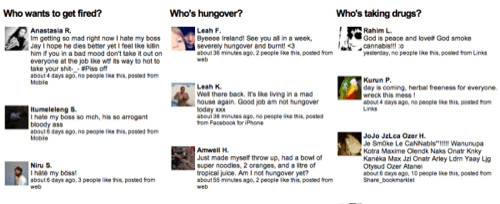If you think a site that pulls your Facebook status updates and FourSquare check-ins to tell the world if you’re hungover, doing drugs or looking to get fired is unsettling, consider this: It’s fairly simplistic when compared to what social networks will one day be able to figure out based on what you choose to broadcast to the world.
Billed as “an experiment by Callum Haywood,” We Know What You’re Doing’s about page makes it clear that all of the information is pulled from the APIs of Facebook and FourSquare. In other words, all of the information is available to anyone with an Internet connection (We Know What You’re doing at least has the courtesy to x-out phone numbers that people post on the site, but otherwise the information appears to be unedited).

Keep in mind that this is simply information that people are willingly and consciously sharing. As the people who study social media sentiment get better at what they’re doing, it’s inevitable that one day, enough information will be able to be culled from our status updates to create a competing site: We Know What You’re Doing (Even If You Don’t).
For example, earlier this year Facebook’s Data Science team posted lists of songs people had listened to before they changed their status to enter a relationship and songs they had listened to after they broke off a relationship, as signaled by their profile. The data is raw, but it’s safe to imagine that even if people choose not to share their relationship statuses online, we may one day be able to infer enough from everything else they share to figure that out.
It’s a goldmine for advertisers – push ads for couples’ getaways to people who are listening to Beyonce’s “Love On Top” and ads for online dating services for people who have put “The Cave” by Mumford & Sons on repeat.
“It’s hard to predict where we’ll go, because we’re at the very early stages of this science,” Facebook’s Cameron Marlow said in a compelling profile in the most recent issue of Technology Review. “The number of potential things that we could ask of Facebook’s data is enormous.”
Marlow heads a team of 12 researchers that “can swim in practically the entire ocean of personal data that Facebook maintains.” They blend math and programming with social science to draw all sorts of insights, and Marlow stressed throughout the article that the science is new and the team’s work is only beginning. (Facebook is expected to double the Data Science Team’s size within a year, and the team will take on a higher profile as Facebook tries to prove it’s more than just another site to house ads.)
“For the first time,” Marlow said, “we have a microscope that not only lets us examine social behavior at a very fine level that we’ve never been able to see before but allows us to run experiments that millions of users are exposed to.”
















